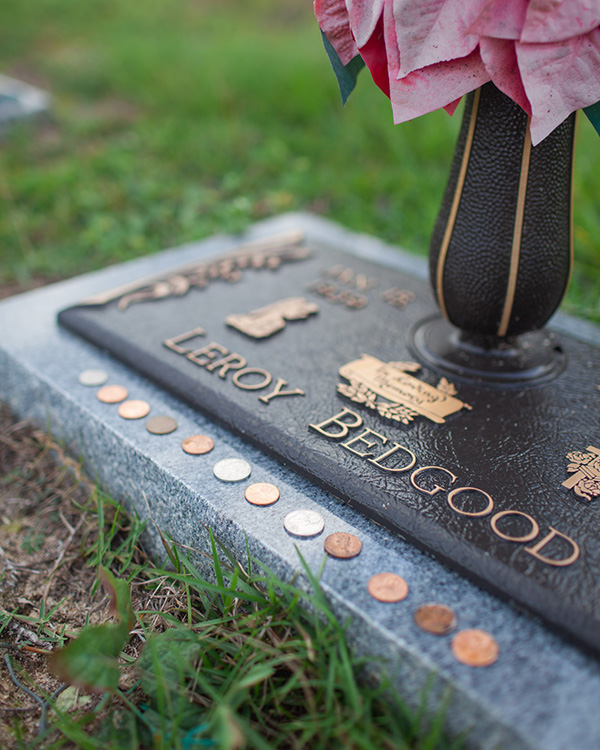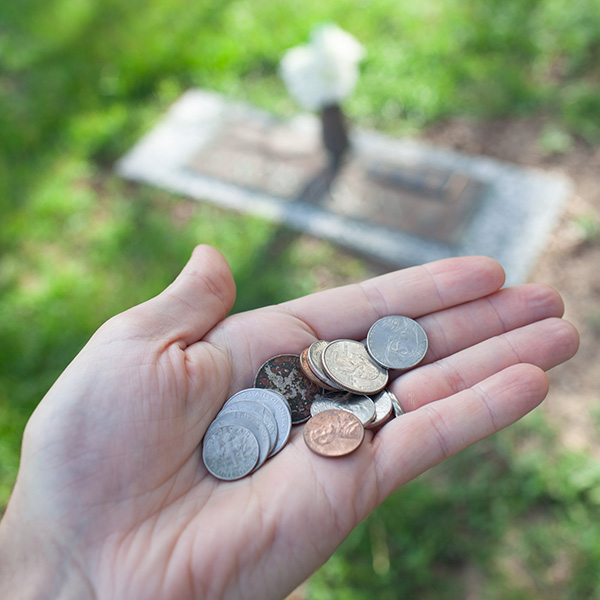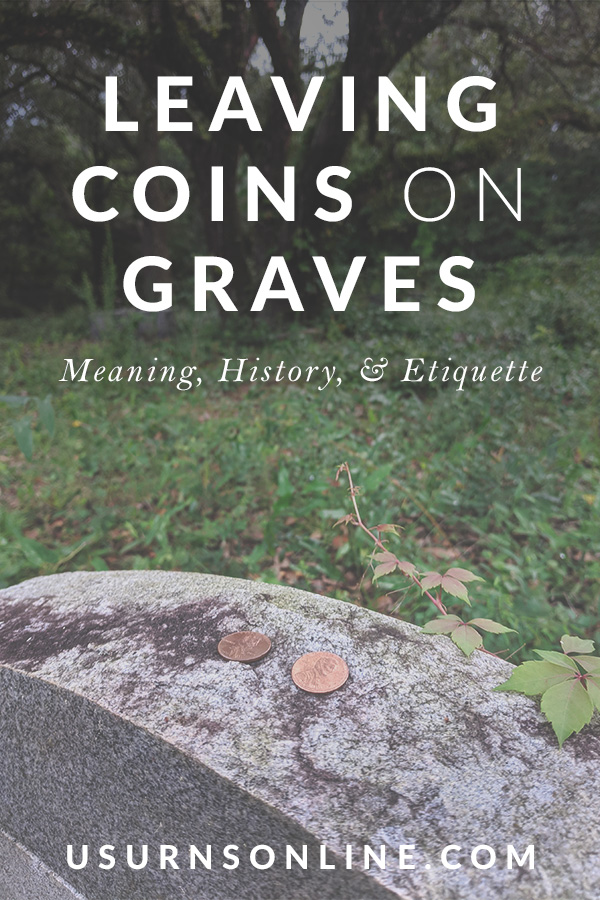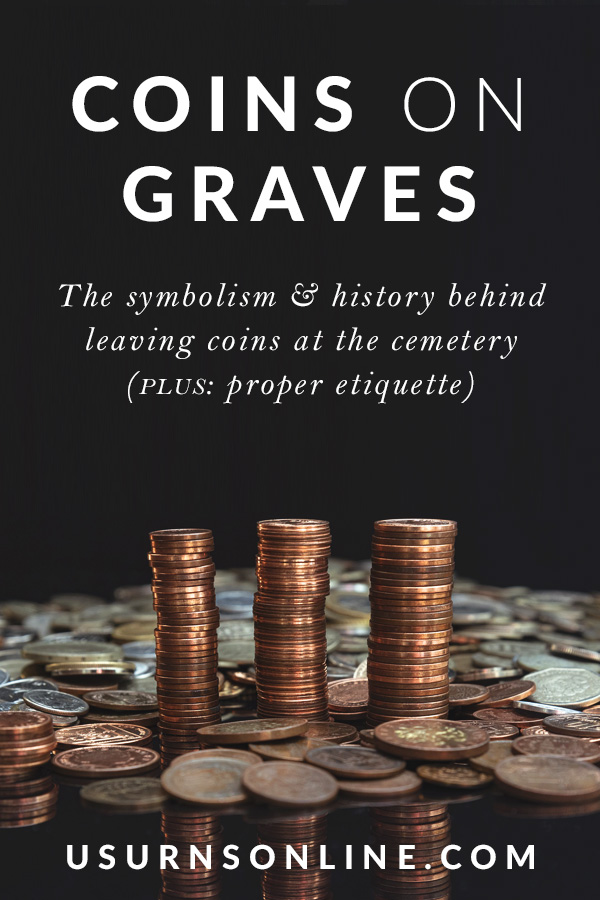Today we’re going to be talking about the meaning and history behind leaving coins on a grave. Have you ever seen a penny, nickel, dime, or even quarter sitting on a headstone? You may have wondered who left it there, and why.
As it turns out, someone didn’t accidentally lose the contents of their wallet while visiting the cemetery. And no, ghosts probably aren’t leaving the coins there, either. Coins on graves are left intentionally by people who stop by the grave to pay their respects.
Let’s take a more detailed look at this practice, and what it signifies.
History of Leaving Coins on Gravestones
Leaving coins on gravestones is a longstanding practice, developed over centuries through a blend of myth and ritual.
Ancient Greek Myth of Charon and the River Styx
To see the bigger picture of why people traditionally leave coins on gravestones, we first have to go back in time a little. Okay, back in time a lot. All the way back to ancient Greece.
Ancient Greek mythology tells us the story of Charon. He was the fabled ferryman of the underworld believed to navigate departed souls across the River Styx and into the land of the dead.
Charon needed payment to be able to carry out this service, and so coins were placed over the eyes or in the mouths of the deceased as remittance. Consequently, if no bribe was offered to Charon, access across the river was denied, and the soul of the deceased was cursed to roam its banks for a hundred years.
Other Mementos Left On Graves
Throughout the centuries, other religions and cultures have also paid their respects to the dead by leaving with them not just coins, but other symbolic or sentimental objects.
Ancient Egyptians would bury their dead with items they believed would benefit them in the afterlife, such as jewelry or shabti dolls.
The Navajo tribe would kill and bury the deceased’s horse with them, so that they could travel into the afterlife.
Urns Made in the USA
And observing the burial story of Jacob’s wife Rachel, the Jews have long placed pebbles or rocks on the headstones of their loved ones, as a sign that someone visited:
“So Rachel died and was buried on the way to Ephrath (that is, Bethlehem). And Jacob set a pillar on her grave, which is the pillar of Rachel’s grave to this day.”
Genesis 35:19-20
In modern Americana, you will commonly see flowers at gravesites of loved ones. Mementos that hold special personal meaning to the deceased or their family, like a flag for a veteran or a teddy bear for an infant, may also be left or displayed at a grave.
It’s all the same idea: When you visit a grave, don’t come empty-handed. A small gift or token that shows you’ve visited, and is a way to physically “pay” your respects.
But coins are still especially symbolic as a modern American grieving ritual. To understand why, we have to go back to the 1960s, when the Vietnam War was rampaging.
Meaning of Coins on Gravestones

The practice of leaving coins on graves has deep symbolic meaning rooted in military tradition.
Coins on Military Graves
History of coins on graves
While this history of leaving coins on graves can be traced back to the Roman Empire, the modern practice began with Vietnam veterans. It was a way for fellow service members to honor those who died in service, and to subtly let the deceased soldier’s family know that someone cared enough to visit the grave.
During the Vietnam War, political strife was rampant. Even between families of servicemen and women who were serving or had served, opinions as to the necessity of the war greatly varied. Communication between those who were once good friends became muddled. But there was still a need to pay respects to comrades who had died.
Servicemen and women who were fortunate enough to come home needed a way to bypass political tensions, yet still let their fallen comrades’ families know that they had paid their respects. So, they started leaving coins on headstones as a form of communication.
These small tokens were readily available (remember, this was a time when cash was prevalent) and easy to set in a noticeable place. As time went on, each coin gained a special significance.
What does each coin represent?
Each coin left at the grave of a veteran, whether a penny, nickel, dime or quarter, has a special significance.
- Quarter – A quarter on a grave means that the person who left it there was with the fallen soldier when they died.
- Dime – A dime on a grave means that the two served together at some point in their careers.
- Nickel – A nickel on a grave means that the person who left it there trained with the deceased, usually at boot camp.
- Penny – A penny on a grave means that a fellow serviceman or woman has recently stopped by to pay their respects, whether or not they knew them personally.
People sometimes leave challenge coins in particular at military headstones. Usually displaying the emblem of a particular military unit, comrades of the late soldier will leave these special coins as a sign that they will never forget their brother or sister-in-arms.
A challenge coin may be a small coin or medallion, bearing an organization’s insignia or emblem and carried by the organization’s members. Traditionally, they might be given to prove membership when challenged and to enhance morale. In addition, they are also collected by service members and law enforcement personnel.
Wikipedia
What happens to coins left on graves?
It’s important to note that when visitors leave coins at National Cemeteries, they are eventually gathered and go toward an important cause, such as the burial of homeless veterans.
The coins left on graves in public cemeteries typically go into a fund for cemetery upkeep or low-or-no-cost burials for the poor.
Coins on Non-Military Graves
Coins left on non-military headstones are not quite as common, but when you see them, the meaning is similar.
- Quarter – Means that you were with the decedent when they passed away.
- Dime – Signifies that you worked together.
- Nickel – Says that you went to school together.
- Penny – Means that you visited the grave and wanted to pay your respects.
Commemorating the Famous/Infamous
People have long set coins and other tokens of remembrance on the graves of the famous (and infamous), and for a variety of reasons. Here are some examples:
- Those paying respects to Texas actor Audie Murphy’s grave at Arlington National Cemetery will often do so with coins. Murphy was one of the most highly decorated servicemen in our nation’s history.
- The legendary Johnny Appleseed’s grave in Fort Wayne, Indiana, usually includes apples in homage to his legacy.
- For years, the mysterious Edgar Allan “Poe Toaster” would come to the famous poet’s grave in Baltimore to toast him. He would leave a bottle of cognac and a few roses at the grave.
- Fans leave coins atop author Harper Lee’s grave in Alabama.
- You’ll find pennies on John Wilkes Booth’s tombstone. They are heads up, in reprisal of him and in honor of the President whose life he took.
- People leave pennies on the grave of notorious Chicago gangster John Dillinger, in hopes of good luck.
- Coins often adorn gunslinger Doc Holliday’s grave marker in Glenwood Springs, Colorado.
- Coins, flowers and other tokens never cease to grace The Doors’ singer Jim Morrison’s grave site in Paris.
- Well-wishers have slowly discolored actress Marilyn Monroe’s tomb from all the lipstick-infused kiss marks they’ve left over the decades.
- Baseball enthusiasts pay respects at Babe Ruth’s monument marker by leaving behind balls and bats.
- You can find pennies, flowers, and even old cigarette butts at actor James Dean’s famous grave.
It’s good to know how traditions begin, but these days, you don’t have to be in the military (or famous or infamous) to have coins, stones or other items left on your headstone.
Anyone can leave a token of remembrance at anyone’s grave that they loved, for any good reason.
Etiquette for Leaving Coins on a Grave

Found a coin on a grave? Cool – let it be.
It goes without saying, but if you see a coin (or any other object or artifact) sitting atop a gravestone, it’s best to leave it there; it’s not an accident. Acknowledge it for what it is: a symbol of respect and a token of remembrance for a life that once was.
Want to leave a coin on a grave? By all means, do so!
And if you want to leave a coin out of respect at the grave of someone, by all means, do so. We have this ritual and tradition for a reason; it allows us to commemorate a life once lived, while also providing our hearts and minds with the rectitude that comes with paying respects to someone we once loved or admired.
Have you ever seen a coin or coins atop a grave in a cemetery? Or have you ever placed a coin on the grave of a loved one? Let us know your experience in a comment below.
What NOT to do…
There are some things that are okay to do in a cemetery, like placing coins on graves. But it’s wise to be aware of the things you shouldn’t be doing in a cemetery, too. We wrote about the 10 things you really shouldn’t do in a cemetery, no matter what.






One small objection to the claim about what different coins represent for the military. It is stated here as if these definitions are always true for all coins by anyone who places them. While this may be true for some people, it is not logical to apply someone’s definition across the board for everyone. Some might leave whatever they have in their pocket. Some may leave only pennies, saving larger amounts for actual purchases. Some might leave a coin without thinking about which one. Who knows why people do what they do, but I doubt most follow someone else’s guidelines as to which coin to leave, and so it is inappropriate to state what the meaning is when you truly don’t know.
Hi Ray,
Yes, that’s a great clarification! We’ve listed the more traditional meanings, but people can (and do) place any type of coin as a tribute.
I buried my infant son in a cemetery in Oklahoma and his dad and I always put pennies on his headstone saying they were pennies from heaven. I left Oklahoma almost 30 years ago and his dad still places them on there.
I buried my son at the age of 2 in 2008 and I leave dimes at his headstone when I visit and then later on I see them laying around where I’ve been or other places sometimes they actually hit me lol.
What about alcohol at a grave? Opened or poured over the stone? I’ve seen both depicted in film but don’t know the meaning or ‘proper’ method.
Good question. I wouldn’t leave an unopened bottle there. I’m not sure if there is a traditional etiquette, but personally I’d guess that you would pour yourself a drink, “raise a glass” to their memory, then pour out the remainder for your friend or loved one. Don’t leave the bottle as it is likely to break and spread glass everywhere.
What about half dollars on graves? What does that symbolize?
Great question! I haven’t found a specific tradition of meaning for half dollars or 50 cent pieces. It appears that you would be able to create your own meaning for leaving a half dollar, or other non-typical coin. It’s a chance to say what you want, in honor of a loved one.
Any idea why there are coins on a horses grave ,,this horse did win the Kentucky derby many years ago
I would guess it’s the same general idea: Visitors to the cemetery paying their respects to the horse. For non-military decedents, the specific meanings of the coins don’t apply and the meaning is simply a gesture of appreciation and respect.
I just recently visited the cemetery at Ft Staton in NM.
This was the first time I had heard about leaving coins at the grave site of a fallen soldier. It was quite enlightening and very informative to read about the coins and why various ones are left.
And so I can home to read more bout it. This site was very helpful in explaining the historical tradition about coins at the grave site.
Thank you
Half dollar
– left by widow representing half of their heart, not being whole.
The Coins for Military Graves in an important start. Is there any increased symbiology. If someone who was specifically connected to the Soldier in some way. Commander, subordinate, friend or Chaplain? I could see leaving a rank or a patch? What are your thoughts?
Hey David,
Great question! Military people might know more, but I haven’t found anything that is traditionally associated with the connections you mentioned. At that level, I think you would want to leave something that symbolizes your relationship in a personal way.
I thought it was really interesting how the coins can be traced back to ancient Greece. My cousin started doing this when visiting our grandpa’s monument. It seems like it could be a cool tradition to pass down to our kids.
How the coins may be traced back to ancient Greece caught my attention. When she went to see the memorial for our grandpa, my cousin started doing this. It sounds like it may be a fun custom we could start for our children.
where my friend is buried,he was in military there are no headstones,justjust flat stone with names,the only thing there is a flag which the cemetary places,why are you not allowed to put flowers?
Hi Lori,
Typically, when cemeteries have these rules, it is to maintain a certain uniform look.